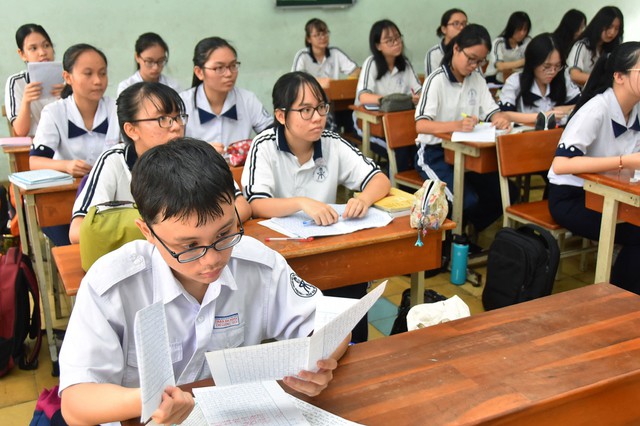Education, with the mission of nurturing knowledge, fostering comprehensive capabilities, and qualities for le...
Education, with the mission of nurturing knowledge, fostering comprehensive capabilities, and qualities for learners, greatly needs reforms in operational methods, improvements in techniques, and methodologies to enhance quality and effectiveness.
Minister of Education and Training Nguyen Kim Son emphasizes four keywords for education in 2024: Competence - Practicality - Quality - Dissemination. These are also the aspirations of those who hold the chalk at the threshold of the new Year of the Tiger, 2024.
Necessary Decisive Changes
The national education system is undergoing transformation with a series of policies aimed at infusing new vitality into the comprehensive renewal of curricula and textbooks. Alongside this are major reforms in teaching methods, assessment techniques, and methods of evaluating learning outcomes.
Like an old operating machine in need of maintenance and replacement of parts, the national education system greatly requires decisive changes to place learners at the center of the process of exploration and mastery of knowledge, nurturing necessary capabilities and qualities to meet the high demands of the digital age, aiming at the goal of "genuine learning, genuine examination, genuine talent" as expected by the Prime Minister.

Education needs reforms in operational methods, improvements in techniques, and methodologies to enhance quality and effectiveness. Photo: TAN THANH
However, honestly looking at the reality of the education sector over the years, we have often pondered the actual effectiveness of reforms, questioned the positive effects of innovation, and wondered about the multidimensional impacts of numerous educational improvements on students, teachers, parents, and public opinion.
There have been changing procedures that have made schools and families spin like whirligigs, unable to adapt. For example, advanced-level exams or high school graduation exams, every few years there is a new admission method, making teachers and students familiarize themselves with new procedures, update new criteria, and supplement new regulations, yet always wondering, "Will the exam change next year, or the year after?"
Some reforms have been struggling, stuck in the scene of "old wine in new bottles," only revolving around changing names. For example, the national primary school excellent student exam created significant pressure on students, so it was "released" by banning primary school excellent student exams, but then fifth-grade students also participated in assessments of competence in mathematics, Vietnamese, and English...
Deepening Reforms
There are too many new things that force teachers to constantly update, repeatedly initiate, and "transform" diligently, but sometimes they still feel out of sync. A literature lesson each year has to integrate many new contents, such as environmental education, national security, violence prevention...
Some changes are merely superficial, heavy on theory, making teachers tired of mechanically memorizing names. Lesson plans had to be changed to "teaching plans"; curriculum distribution was renamed "educational plans"; technical innovations replaced "experiential innovations"... While the quality of lesson plans, the rationality of curriculum distribution, and the effectiveness of using experiential innovations remain uncertain...
The academic year 2023 - 2024 is designated as the "Acceleration Year" for educational innovation, but there are still many concerns. There is a serious shortage of teachers while the number of teachers resigning continues to increase. Has the shortage of teachers in subjects such as music, fine arts, informatics, and English been overcome from the previous academic year?
There are still many unresolved challenges in implementing integrated teaching (natural sciences, history and geography, local education). Many difficulties have not been fully anticipated when implementing the policy of "one curriculum, multiple textbooks"...
The accelerated educational reform academic year of 2023 - 2024 will continue to revolve in sync with the large education system of the comprehensive general education curriculum of 2018. Education, with the mission of nurturing knowledge, fostering comprehensive capabilities, and qualities for learners, greatly needs reforms in operational methods, improvements in techniques, and methodologies to enhance quality and effectiveness.
It is hoped that any educational innovation policy must delve into its depth. Focusing on relieving pressure on the teaching staff, allowing them to devote themselves to the profession, resolutely addressing the human resource shortages in integrated subjects, and reaching a consensus on the policy of "one curriculum, multiple textbooks" are urgent requirements.
Teaching methods are sometimes confusing because teachers have not fully grasped and mastered the new techniques, while new requirements are waiting to compete for space...
Via Nguoi lao dong